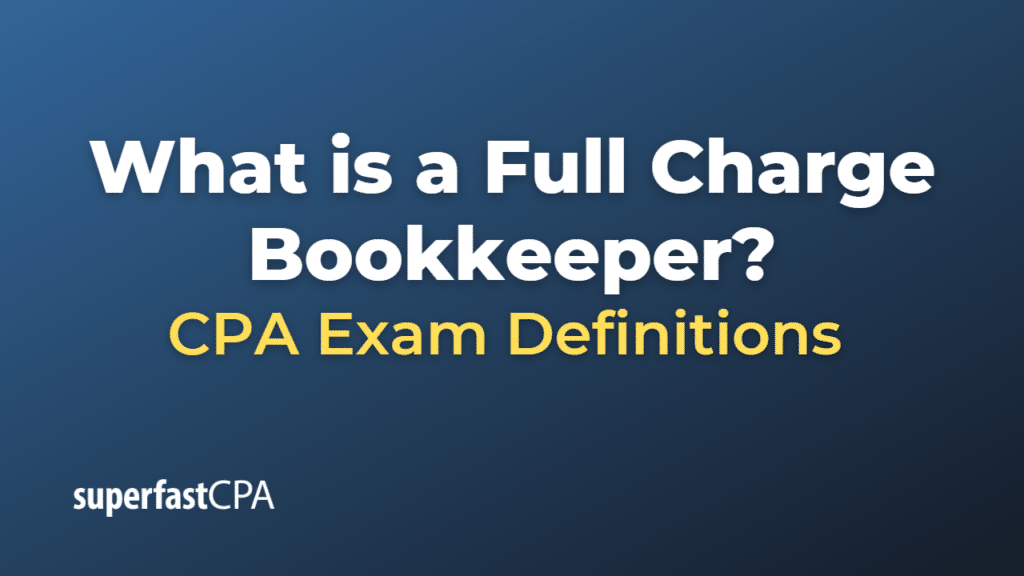Full Charge Bookkeeper
A full charge bookkeeper is a professional who manages all the financial records of a small to medium-sized business. This includes, but is not limited to, managing accounts payable and receivable, payroll, bank reconciliations, ledger entries, monthly and year-end closings, and financial statement preparation. The “full charge” aspect refers to the fact that these bookkeepers have full responsibility for the company’s accounting processes.
In some organizations, full charge bookkeepers may also handle additional administrative or HR-related tasks, such as processing new hires or handling benefits administration.
Unlike a regular bookkeeper who may only handle certain aspects of a company’s financial record keeping, a full charge bookkeeper has the knowledge and experience to handle all the bookkeeping needs of a company. However, they generally do not perform more strategic financial activities like financial analysis, planning, or forecasting, which would typically fall under the responsibilities of a controller or CFO.
Here are some tasks a Full Charge Bookkeeper might be responsible for:
- Accounts Payable: Recording and paying bills, managing relationships with vendors, ensuring accuracy of invoices.
- Accounts Receivable: Generating invoices, tracking and recording payments, managing late or missed payments.
- Payroll: Processing payroll, ensuring tax compliance, managing payroll deductions and benefits.
- Bank Reconciliation: Comparing internal records against monthly bank statements to catch and correct any discrepancies.
- General Ledger: Keeping accurate records of all financial transactions, making appropriate entries in the general ledger.
- Financial Statements: Preparing income statements, balance sheets, and cash flow statements.
- Reporting and Compliance: Preparing reports for management, ensuring compliance with local, state, and federal government reporting requirements and tax filings.
A Full Charge Bookkeeper often requires more experience and education than a regular bookkeeper, and they may hold certifications like the Certified Bookkeeper (CB) designation from the American Institute of Professional Bookkeepers.
Example of a Full Charge Bookkeeper
Let’s imagine a scenario where a Full Charge Bookkeeper plays a crucial role:
Suppose there is a growing small business named “GreenTech Landscaping.” They provide landscaping and garden maintenance services. When GreenTech was a very small company, the owner, Laura, handled all the bookkeeping duties. But as the business grew, she realized she needed a professional to take over the finances so she could focus more on strategic and operational aspects.
Laura hired John, a Full Charge Bookkeeper. His responsibilities include:
- Accounts Payable: John receives and verifies invoices from suppliers who provide gardening tools, plants, and fertilizers. He processes payments in a timely manner, ensuring GreenTech maintains a good relationship with its suppliers.
- Accounts Receivable: When GreenTech provides services to its customers, John creates and sends invoices. He records all the payments received and follows up on any overdue payments.
- Payroll: GreenTech has 15 employees. Every pay period, John processes their salaries, makes the appropriate deductions for taxes and benefits, and ensures that all payments are made on time. He also takes care of the year-end tax forms for employees.
- Bank Reconciliation: John checks the company’s bank statements against the internal financial records each month. He identifies and resolves any discrepancies to ensure the accuracy of GreenTech’s financial data.
- General Ledger: John maintains the general ledger, recording all financial transactions accurately. This includes all sales and purchases, payroll transactions, and any adjustments.
- Financial Statements: At the end of each quarter, John prepares financial statements, including the income statement, balance sheet, and statement of cash flows. He provides these to Laura, who uses them to make informed decisions about the company’s future.
- Reporting and Compliance: John prepares regular financial reports for Laura and ensures that GreenTech is compliant with all relevant tax laws and financial reporting regulations. He handles the company’s tax filings and interacts with external auditors when necessary.
John, as a Full Charge Bookkeeper, has taken over the complete management of GreenTech’s financial affairs. This allows Laura to focus on growing the business, knowing that its financial records are in capable and reliable hands.













